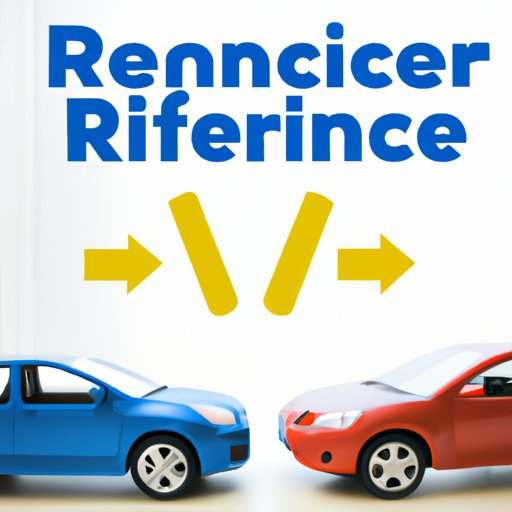Introduction
When it comes to financing a car, there are two main options: refinancing and trading in your car. Refinancing is when you take out a new loan with a different lender to pay off an existing loan on your car. This can help you save money by reducing your monthly payments or interest rate. Trading in your car is when you use the equity in your current vehicle as a down payment towards a new one. Both options have their advantages and disadvantages, so it’s important to understand the pros and cons before making a decision.

Analyzing the Pros and Cons of Refinancing vs Trading In Your Car
Financial Benefits of Refinancing or Trading In Your Car: The most obvious benefit of either option is the potential for financial savings. When you refinance your car loan, you may be able to reduce your monthly payments and/or interest rate, which can save you money over time. When you trade in your car, you can use the equity in your current vehicle as a down payment towards a new car, reducing the amount you need to finance.
Advantages and Disadvantages of Refinancing and Trading In Your Car: Refinancing can be beneficial if you can get a lower interest rate than your current loan. However, it could also have some drawbacks, such as additional fees and a longer repayment period. Trading in your car can be beneficial if you’re looking to upgrade to a newer model, but you may not get as much value for your current car compared to selling it yourself.
Exploring the Short-Term and Long-Term Impact of Refinancing or Trading In Your Car
Understanding the Costs Involved With Refinancing or Trading In Your Car: Before making a decision, it’s important to understand the costs associated with both refinancing and trading in your car. Refinancing will typically involve additional fees, such as application fees, origination fees, and closing costs. Trading in your car may also involve additional costs, such as sales tax and registration fees on the new vehicle.
Examining the Factors That Influence Whether to Refinance or Trade In Your Car: There are several factors that can influence whether it’s better to refinance or trade in your car. These include your credit score, the amount of your down payment, the interest rate on your loan, and the loan terms. Additionally, the age and condition of your car will impact its trade-in value.
Weighing the Short-Term and Long-Term Impacts of Refinancing or Trading In Your Car: It’s important to consider both the short-term and long-term impacts of refinancing or trading in your car when making a decision. Refinancing may provide immediate savings, but it could also increase the total amount you pay over the life of the loan. Trading in your car could provide more immediate savings, but it could also result in higher payments over the long term.
What to Consider When Deciding Between Refinancing and Trading In Your Car
Interest Rates: The interest rate on your loan is a key factor to consider when deciding between refinancing or trading in your car. If you can get a lower interest rate by refinancing, then this may be the better option. However, if you don’t qualify for a lower interest rate, then trading in your car could be more beneficial.
Loan Terms: The length of your loan is another important factor to consider. Refinancing may provide the opportunity to extend the loan term, which could result in lower monthly payments. On the other hand, trading in your car could allow you to get a shorter loan term, which would result in higher monthly payments but lower total interest paid.
Credit Score: Your credit score is another factor to consider when deciding between refinancing or trading in your car. A higher credit score can make it easier to qualify for a lower interest rate, which could make refinancing the better option. However, if you have a lower credit score, then trading in your car may be more beneficial.
Down Payment: The amount of your down payment is yet another factor to consider. If you have enough equity in your current car, then trading in your car may be the better option. Otherwise, you may need to make a larger down payment when refinancing.
Trade-In Value: The trade-in value of your car is another important factor to consider. If you can get more value for your car by selling it yourself, then this could be the better option. However, if the trade-in value is close to the private sale value, then trading in your car may be more beneficial.
Conclusion
Refinancing or trading in your car can both have their advantages and disadvantages, so it’s important to understand the pros and cons before making a decision. You should also consider factors such as your credit score, the amount of your down payment, the interest rate on your loan, the loan terms, and the trade-in value of your car. Ultimately, the best option for you will depend on your individual situation and goals.
In summary, when deciding between refinancing or trading in your car, it’s important to consider the financial benefits of each option, as well as the short-term and long-term impacts. Additionally, you should weigh factors such as interest rates, loan terms, credit score, down payment, and trade-in value. By understanding the pros and cons of each option and considering these factors, you can make an informed decision that best meets your needs.
(Note: Is this article not meeting your expectations? Do you have knowledge or insights to share? Unlock new opportunities and expand your reach by joining our authors team. Click Registration to join us and share your expertise with our readers.)
